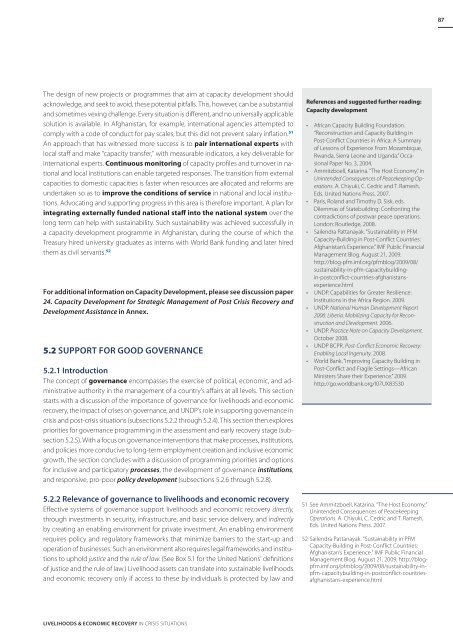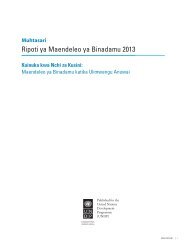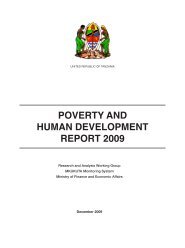Download PDF (4.08 MB) - ReliefWeb
Download PDF (4.08 MB) - ReliefWeb
Download PDF (4.08 MB) - ReliefWeb
You also want an ePaper? Increase the reach of your titles
YUMPU automatically turns print PDFs into web optimized ePapers that Google loves.
87<br />
The design of new projects or programmes that aim at capacity development should<br />
acknowledge, and seek to avoid, these potential pitfalls. This, however, can be a substantial<br />
and sometimes vexing challenge. Every situation is different, and no universally applicable<br />
solution is available. In Afghanistan, for example, international agencies attempted to<br />
comply with a code of conduct for pay scales, but this did not prevent salary inflation. 51<br />
An approach that has witnessed more success is to pair international experts with<br />
local staff and make “capacity transfer,” with measurable indicators, a key deliverable for<br />
international experts. Continuous monitoring of capacity profiles and turnover in national<br />
and local institutions can enable targeted responses. The transition from external<br />
capacities to domestic capacities is faster when resources are allocated and reforms are<br />
undertaken so as to improve the conditions of service in national and local institutions.<br />
Advocating and supporting progress in this area is therefore important. A plan for<br />
integrating externally funded national staff into the national system over the<br />
long term can help with sustainability. Such sustainability was achieved successfully in<br />
a capacity development programme in Afghanistan, during the course of which the<br />
Treasury hired university graduates as interns with World Bank funding and later hired<br />
them as civil servants. 52<br />
For additional information on Capacity Development, please see discussion paper<br />
24. Capacity Development for Strategic Management of Post Crisis Recovery and<br />
Development Assistance in Annex.<br />
5.2 Support for Good Governance<br />
5.2.1 Introduction<br />
The concept of governance encompasses the exercise of political, economic, and administrative<br />
authority in the management of a country’s affairs at all levels. This section<br />
starts with a discussion of the importance of governance for livelihoods and economic<br />
recovery, the impact of crises on governance, and UNDP’s role in supporting governance in<br />
crisis and post-crisis situations (subsections 5.2.2 through 5.2.4). This section then explores<br />
priorities for governance programming in the assessment and early recovery stage (subsection<br />
5.2.5). With a focus on governance interventions that make processes, institutions,<br />
and policies more conducive to long-term employment creation and inclusive economic<br />
growth, the section concludes with a discussion of programming priorities and options<br />
for inclusive and participatory processes, the development of governance institutions,<br />
and responsive, pro-poor policy development (subsections 5.2.6 through 5.2.8).<br />
5.2.2 Relevance of governance to livelihoods and economic recovery<br />
Effective systems of governance support livelihoods and economic recovery directly,<br />
through investments in security, infrastructure, and basic service delivery, and indirectly<br />
by creating an enabling environment for private investment. An enabling environment<br />
requires policy and regulatory frameworks that minimize barriers to the start-up and<br />
operation of businesses. Such an environment also requires legal frameworks and institutions<br />
to uphold justice and the rule of law. (See Box 5.1 for the United Nations’ definitions<br />
of justice and the rule of law.) Livelihood assets can translate into sustainable livelihoods<br />
and economic recovery only if access to these by individuals is protected by law and<br />
References and suggested further reading:<br />
Capacity development<br />
• African Capacity Building Foundation.<br />
“Reconstruction and Capacity Building in<br />
Post-Conflict Countries in Africa: A Summary<br />
of Lessons of Experience From Mozambique,<br />
Rwanda, Sierra Leone and Uganda.” Occasional<br />
Paper No. 3, 2004.<br />
• Ammitzboell, Katarina. “The Host Economy,” in<br />
Unintended Consequences of Peacekeeping Operations.<br />
A. Chiyuki, C. Cedric and T. Ramesh,<br />
Eds. United Nations Press. 2007.<br />
• Paris, Roland and Timothy D. Sisk, eds.<br />
Dilemmas of Statebuilding: Confronting the<br />
contradictions of postwar peace operations.<br />
London: Routledge, 2008.<br />
• Sailendra Pattanayak. “Sustainability in PFM<br />
Capacity-Building in Post-Conflict Countries:<br />
Afghanistan’s Experience.” IMF Public Financial<br />
Management Blog. August 21, 2009.<br />
http://blog-pfm.imf.org/pfmblog/2009/08/<br />
sustainability-in-pfm-capacitybuildingin-postconflict-countries-afghanistansexperience.html<br />
• UNDP. Capabilities for Greater Resilience:<br />
Institutions in the Africa Region. 2009.<br />
• UNDP. National Human Development Report<br />
2006: Liberia. Mobilizing Capacity for Reconstruction<br />
and Development. 2006.<br />
• UNDP. Practice Note on Capacity Development.<br />
October 2008.<br />
• UNDP BCPR. Post-Conflict Economic Recovery:<br />
Enabling Local Ingenuity. 2008.<br />
• World Bank. “Improving Capacity Building in<br />
Post-Conflict and Fragile Settings—African<br />
Ministers Share their Experience.” 2009.<br />
http://go.worldbank.org/I07UX83S30<br />
51 See Ammitzboell, Katarina. “The Host Economy,”<br />
Unintended Consequences of Peacekeeping<br />
Operations. A. Chiyuki, C. Cedric and T. Ramesh,<br />
Eds. United Nations Press. 2007.<br />
52 Sailendra Pattanayak. “Sustainability in PFM<br />
Capacity-Building in Post-Conflict Countries:<br />
Afghanistan’s Experience.” IMF Public Financial<br />
Management Blog. August 21, 2009. http://blogpfm.imf.org/pfmblog/2009/08/sustainability-inpfm-capacitybuilding-in-postconflict-countriesafghanistans-experience.html<br />
Livelihoods & Economic Recovery in Crisis Situations





